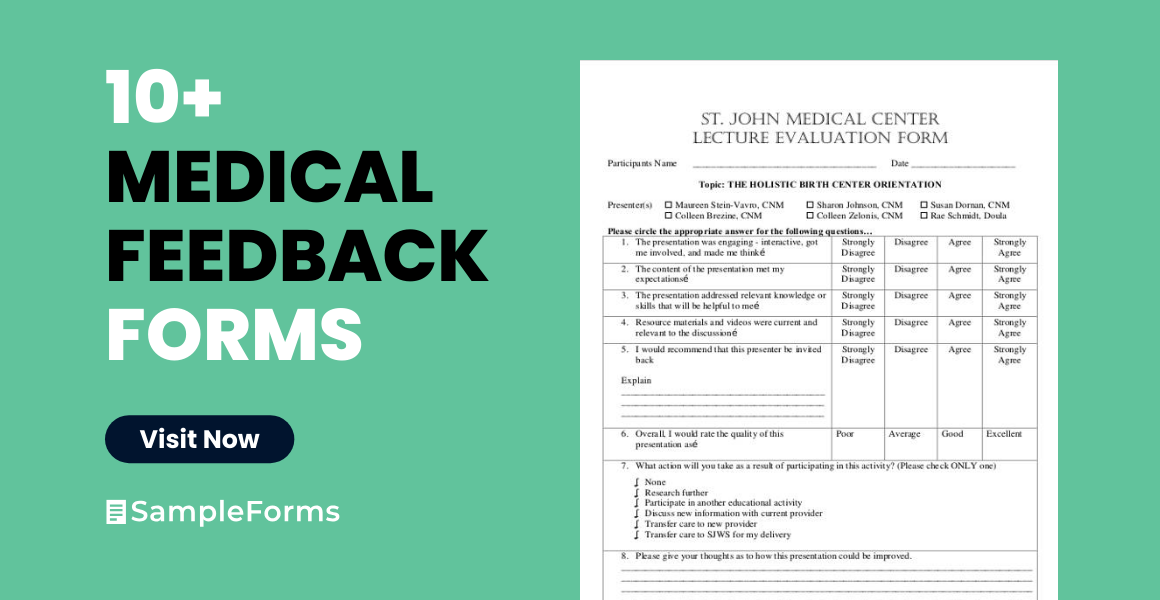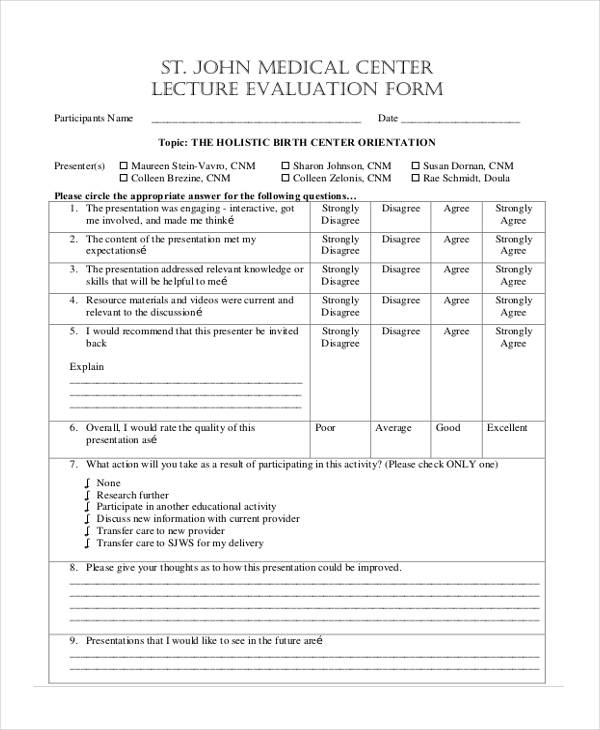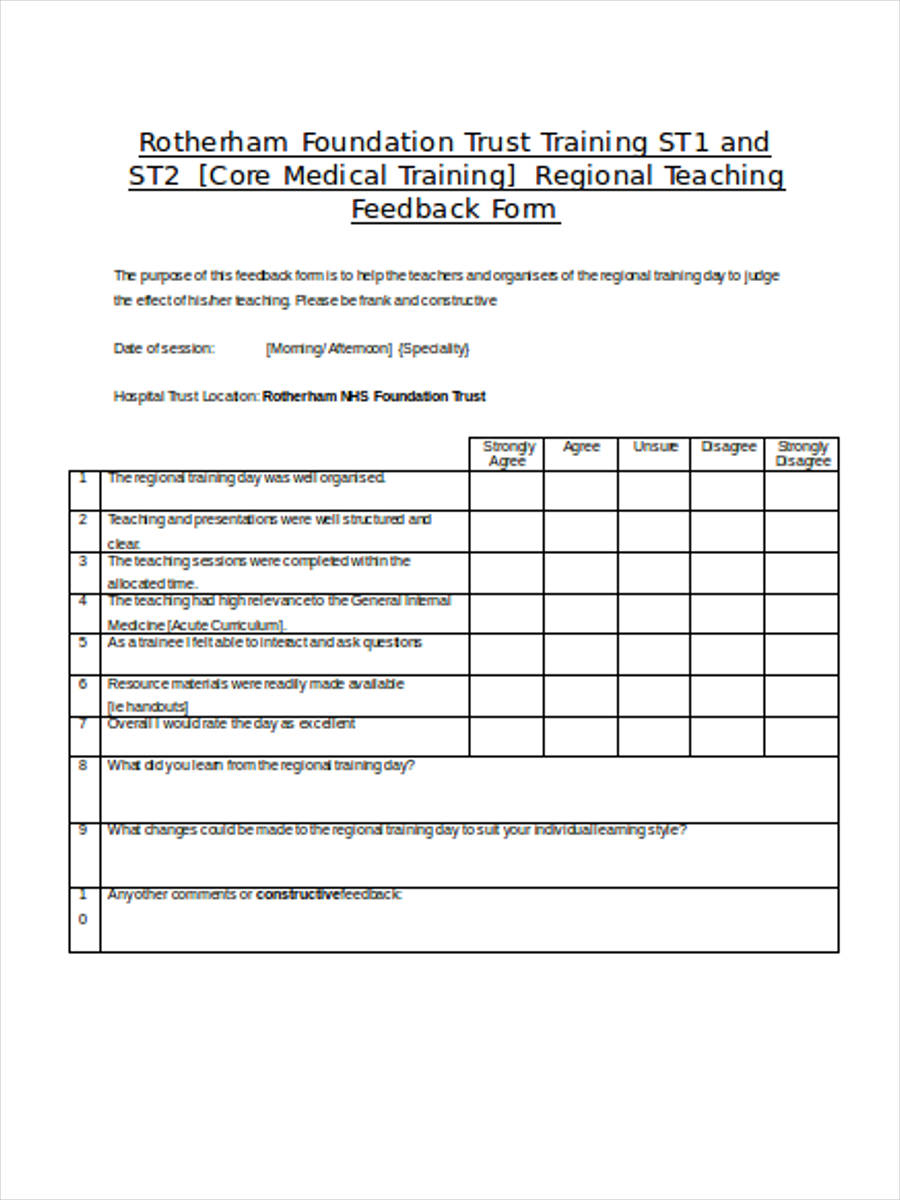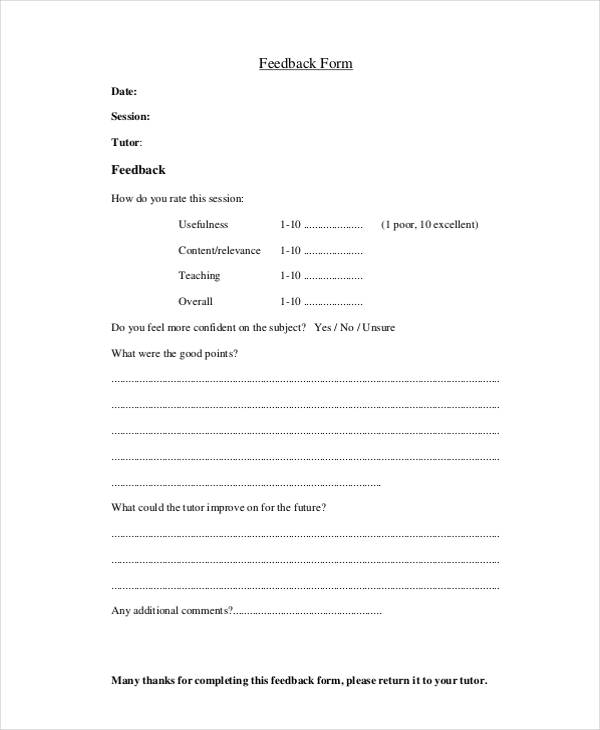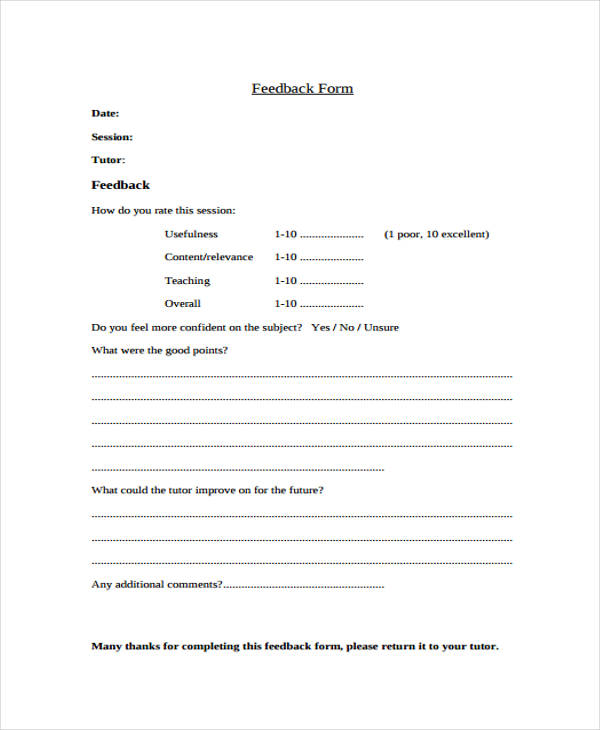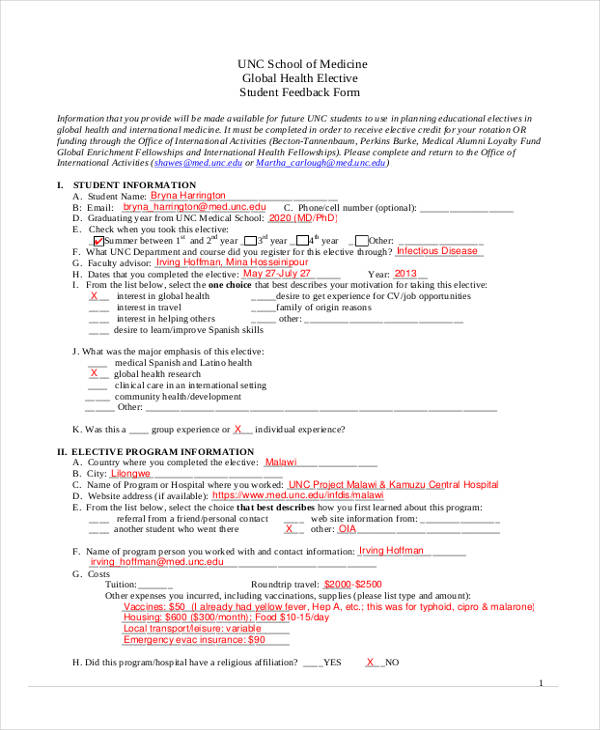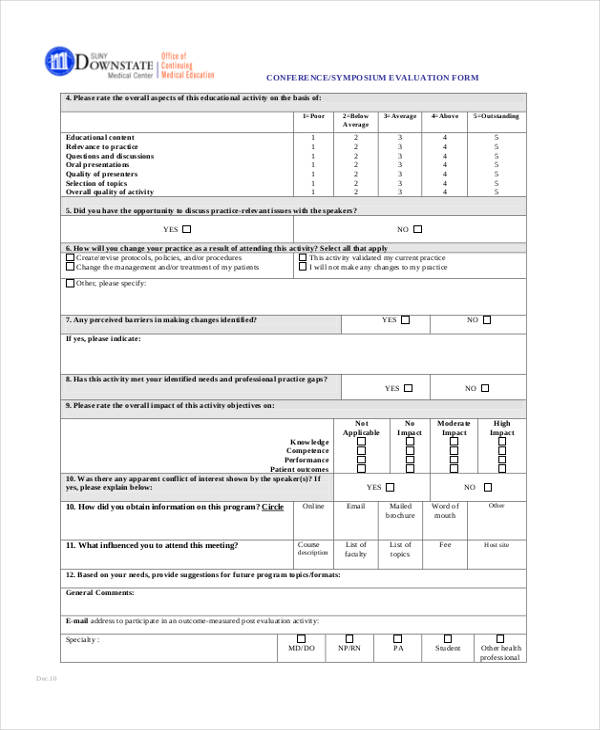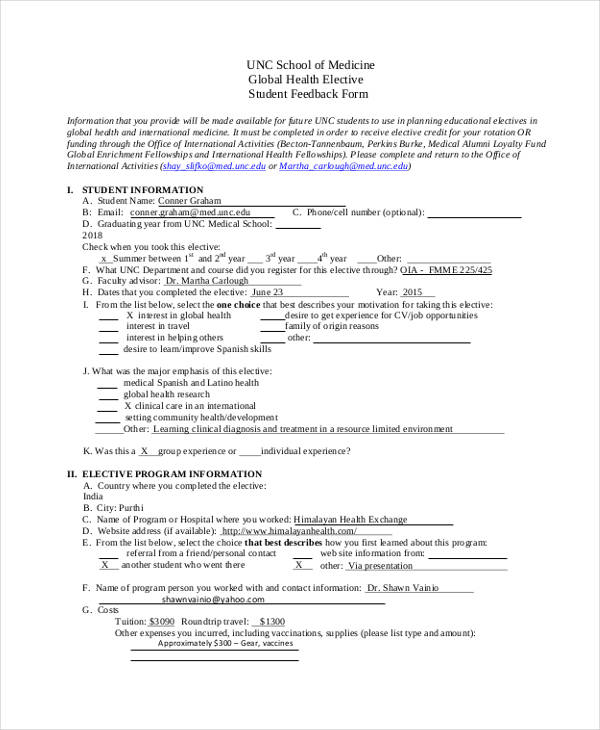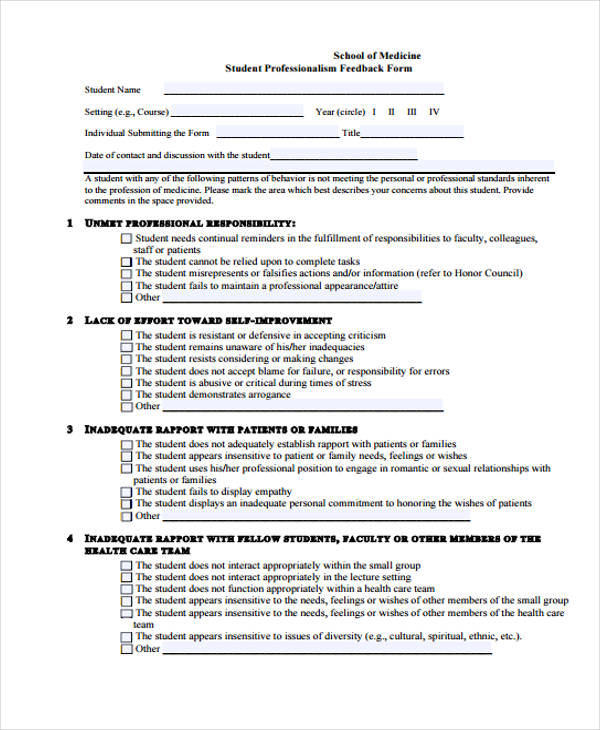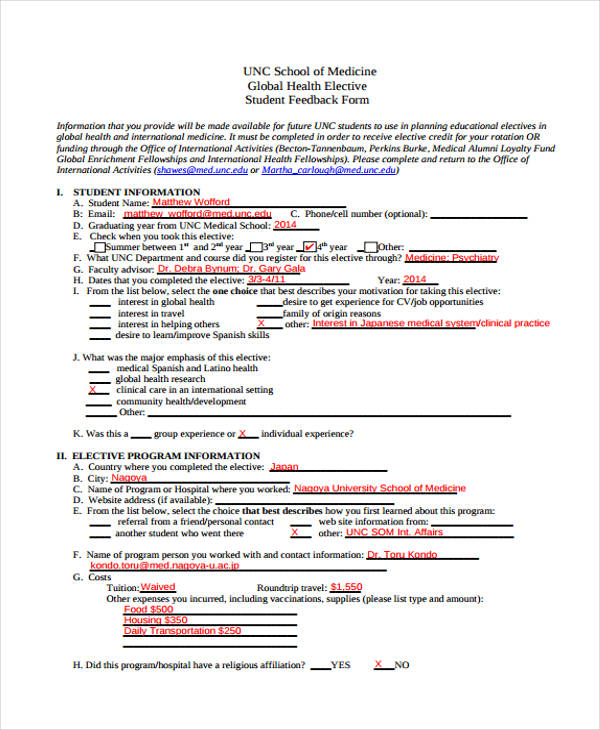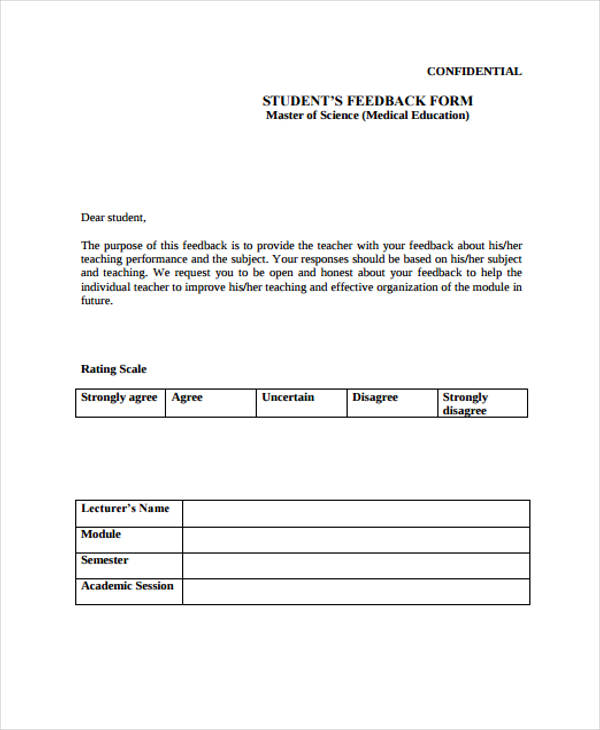Whether you give or receive it, feedback will always come in handy. The reason for this is because feedback allows one to hand out or obtain information that could be essential for development as well as improvement. Which is why a lot of people need to understand just how helpful productive feedback can be.
Many different managers and supervisors understand that efficient feedback is what will eventually lead to a persons’s as well as a business’s success. So whether the feedback is positive or negative, one must understand that it’s something that’s aimed to help rather than something that leads people to failure.
Free Medical Lecture Evaluation Feedback Form
Medical Training Feedback
Medical Student Teaching Feedback Form
Medical Student Feedback Example Form
What Is a Medical Feedback Form?
A medical feedback form is what one utilizes in the event that he or she has undergone any medical training, treatments, or course. With it, people are able to rate about how they felt on whatever it is they have to provide feedback to.
Medical feedback forms also allow these people to make comments regarding what should be improved, changed, or removed for further improvement. So those that receive these forms should expect to learn whatever it is they can from the information it provides to ensure that whatever medical service they hand out is satisfactory enough to those that need them.
Steps In Making a Complaint When Providing Medical Feedback
There will be times where one receives medical treatment and finds certain things either questionable or unacceptable. So once that happens, one can make a complaint by using the feedback form that was handed out. There are even instances wherein others may provide the complaint on your behalf. If it’s a child that wishes to file a complaint, then all the parent has to do is obtain the child’s consent and then they may proceed to file the complaint on the child’s behalf. So in order for one to point out a problem within the feedback form, here are some easy steps that can do just that:
- Describe the incident. You’ll have to go into detail. If it’s a service complaint then what particular part of the medical service did not meet your expectations? State the facts that can help you solve the problem.
- Explain the order in which everything happened. Retell the sequence of events to ensure that the receiver of the feedback can verify whether what you’re claiming is true or not.
- Place in the date and time as to when the incident occurred, assuming that you can remember or when it’s necessary.
- Explain what kind of action you’d want to be done in order to rectify the problem.
Remember that what these things aim to do is to ensure that you will no longer have to go through this problem again as well as making sure that others do not experience similar problems in the future. So be sure to follow those steps to guarantee that future medical services are improved both for you and others.
Medical Draft Student Feedback Form
Medical Conference Student Feedback Form
Medical Equipment Student Feedback Form
Medicine Student Professionalism Feedback Form
Medical School Student Feedback Form
Medical Education Student Feedback Form
What to Do When Receiving Medical Feedback
Lets say that you’re a medical trainee and that’s it’s time for your training assessment. After your mentor has finished your performance appraisal you will then be given feedback based on how well you’ve been doing. When you receive the feedback, you’ll need to learn how to accept it. So here are a few things you should do once you’re given feedback:
- Listen to whatever your mentor is telling you. You’ll need to get as much information as you can and wait until he or she finishes before you make any sort comment or response.
- You’ll need to understand whatever feedback you’re being given. Once you’re given feedback you’ll need to paraphrase whatever you’re given to ensure that you were able to capture the meaning of whatever feedback you’ve been given. If you’re unsure then all you have to do is ask for the specifics if they haven’t been given. You may even ask for advice or solutions that will help you solve issues.
- Do not be defensive. No matter what kind of criticism you get, you should not prevent it from helping you learn. If you find things unfair, then ask for another appointment to discuss about the feedback to give you time to cool off if you’re very upset. It’s best not to let your emotions get into the matter as you may say things that could end horribly for you.
- No matter what kind of feedback you should get, whether it’s positive or negative, you will need to thank the person who gave you the feedback for the time and effort that was spent into it.
Tips on How to Give Effective Medical Feedback
If you’re a clinical teacher, then its your job to provide both effective and productive teaching feedback to those who wish to learn the medical arts. It is also your job to ensure that those who receive your feedback can easily accept it, as well as use it for further improvement of their performance. So here are some tips that can help:
- Establish an environment where people can easily learn. This is important if you want feedback to as effective as possible. With a proper learning environment, those who give the feedback can ensure that they and the learner are able to work together achieve certain goals. It should always be that the learner assesses his or her self while the teacher gives feedback based on how the learners performance review.
- Communicate with the learner on the goals and objectives of the feedback being handed out. The point of any feedback is to ensure that one can continue to grow. So it’s vital to ensure that the learner understands the goals as well as the objectives of the learning experience. It is also important that he or she knows what achievements that person is expected to achieve. So as the teacher, you will have to inform the learner about the feedback session, set a time and date that’s convenient for both of you, and make agreements on the goals and the expected outcomes.
- Be sure that you make feedback a timely and regular occurrence. What you have to know is that learners need to gain feedback within a certain period or else whatever information you present will become useless. If there are a few behavioral problems that need correction, then you will need to act as soon as possible and give feedback stating how that person’s behavior should be corrected. Because if you wait too long or if you don’t give feedback often, then the leaner will continue to under perform.
- Start by going through the learner’s own self-evaluation. You’ll want to make sure that the learner is aware of how he or she is performing by having that person do a self evaluation first. With self assessment, the learner is more open to receiving corrective feedback, assuming that both you and the learner have come to the same conclusion as to what needs to be worked on. In any case, the learner would still benefit from evaluating himself or herself first as it could still help point out what needs to be worked on, as well as providing you with information that you might not even know about.
- Reinforce any positive behavior. If a medical student receives positive feedback, it can help motivate that person to be more productive and efficient. Considering that medical students have many procedures and information to learn, you’ll need to properly praise them should they be performing in an exemplary manner. So to put it simply, if these people continue to do well, you’ll need to point out what they’re doing well and praise them for it.
- If there are any behaviors or problems that need to be solved, say so right away. There are many cases wherein those who receive medical training often have problems when it comes to learning or how to do certain procedures right. When that happens, you’ll have to point them out as soon as you can by providing that person with timely feedback. Much like handing out positive feedback, you’ll need to point out what the problem is and provide the solution to fix it.
- Confirm that the learner was able to understand and accept whatever feedback you’ve given. You can’t help it sometimes that certain people make complaints regarding the feedback they receive. However, they’ll need to know that whatever type of feedback they receive, it’s only aim is to help and not undermine. So make sure that the receiver perfectly understands the result of the feedback you’ve given.
- Finish by developing an action plan with the learner. Once you have settled everything, you and the learner need to devise an action plan that the two of you agree on that will help the learner develop the skills and knowledge needed in order to improve. The two of you should discuss what needs to be done and agree as to whether or not the learner will benefit from it. You will then agree on a date for the next feedback to see whether the learner has stuck to the agreed action plan and if the learner has improved from it.
Related Posts
-
Restaurant Feedback Form
-
Parent Feedback Form
-
FREE 32+ Different Formats for Feedback Forms in PDF | Ms Word | Excel
-
FREE 11+ Property Feedback Forms in PDF | Ms word
-
FREE 11+ Observational Feedback Forms in PDF | MS Word
-
Nursing Feedback Form
-
Form for 360 Degree Feedback
-
FREE 10+ Feedback Forms Aimed at Doctors | PDF
-
FREE 11+ Demo Feedback Forms in PDF | MS Word
-
FREE 11+ Exam and Test Feedback Forms in PDF | Ms Word
-
Induction Feedback Form
-
Coaching Feedback Form
-
FREE 12+ Forms for Job Application in PDF | MS Word | Excel
-
FREE 10+ Feedback Forms for Lessons in PDF | MS Word
-
FREE 9+ Feedback Forms for Clients in PDF | Ms Word | Excel
